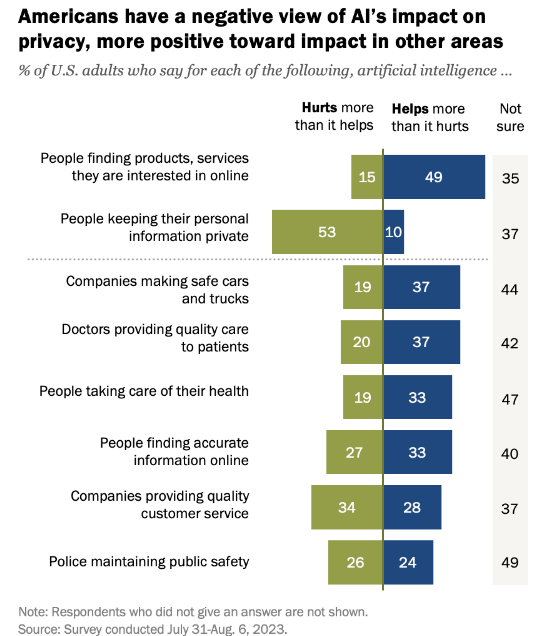Naïve SEO Advice, Meh or Malevolent AI, AI for B2B

Google's 'Naïve' SEO Advice
Google has long promoted the idea that you should create content for people (e.g., Helpful Content Update) and not for its algorithm. The company says it wants publishers and marketers to solve real problems and answer questions with high quality information (see, E-E-A-T). In actuality, content is a means to an end for Google: ad clicks. But we can probably all agree that in a perfect world, people would create great content and it would rank. Yet the incentives Google has intentionally and unwittingly created mostly fly in the face of this idealistic view of content creation. Google says it doesn't want people to focus on "ranking signals" but on content quality. Yet, second guessing ranking signals (see, LSRF) is the bread and butter of SEO. What title tags and meta descriptions does Google reward? What types of images does Google want? How much keyword volume justifies new content? Can we scale landing pages with ChatGPT? What rating do you need to rank for "best"? SEOs are thinking about "helpful content" but they can't help thinking more about ranking. I actually agree with Google's advice – the company is battling declining search quality – but from a digital-marketing perspective, it seems naïve.

AI: Meh or Malevolent?
ChatGPT has released an enterprise version, together with the claim that "80% of Fortune 500 companies already have employees using ChatGPT for work," which is probably inaccurate. The enterprise version is designed to answer corporate fears around data security, amid potential ChatGPT bans. Companies are excited and wary about AI. That generally parallels consumer attitudes. Two new surveys from Pew Research reflect Americans' seemingly contradictory views of the technology. Only 24% of Pew respondents have ever used ChatGPT, which would seem to contradict ChatGPT's early 100 million user claim. Younger people, males and educated consumers have had more experience with it. And while people who've heard of ChatGPT think it will impact jobs in some industries (e.g., software engineering), only 19% think it will affect their jobs. Contrast this with the other survey, which is more ominous: "52% of Americans [ ] feel more concerned than excited about ... artificial intelligence." That concern has grown among those with more exposure to AI. There are nuances, with positive views in some areas (e.g., shopping, healthcare, automotive) and demographic differences.

Our take:
- Strictly speaking these surveys don't contradict one another but they reflect competing sentiments. One is "meh" the other is anxiety. The different results also reflect the different survey questions.
- Search use cases – finding accurate info, online shopping – are among the mostly positively viewed. Shopping is the most embraced, in fact.
- The genie is out of the bottle. Now we as a society must do our best to incentivize positive outcomes and maintain human oversight.
Google's AI B2B Focus
We've argued that Google is only doing SGE in search (and Bard) because it was forced to by BingGPT and OpenAI. Its real focus for AI development is on Ads, B2B and enterprise applications. These will generate direct revenue for the company, whereas SGE is indirect revenue. This week at Google Cloud Next the company made a number of potentially significant B2B AI announcements in its enterprise race against OpenAI, Microsoft and Facebook. Among them was an expansion of Duet AI, which it's positioning as an AI "collaborator" across Google Cloud applications. That includes Google Workspace and Meet in particular, where AI will now take notes and offer meeting summaries. Duet AI can also attend meetings on your behalf (in theory). Google also hopes to reinvigorate Chat with AI features, presumably to compete with Slack. Google also revealed that Workspace now has 10 million paying customers. In addition, there are numerous tools for developers, including Google’s Vertex AI which allows them to build their own generative AI applications using internal data.

Our take:
- Google will see immediate revenue from many of these B2B AI efforts. Duet for Workspace will cost $30 per month, a new premium tier.
- Google Cloud is growing faster than ads. Last quarter revenue was $8 billion, up 28%, with nearly $400M profit. Cloud is now ~10% of revenue.
- Any AI-related search benefits will be a by-product of Google's B2B initiatives. Though unlikely, AI still cound reinvent the search UX.
Recent Analysis
- Near Memo episode 125: SMBs search to find services, GBP support bends to European regs, No copyright for AI
Short Takes
- Google seeks to sell Maps data (via API) on 350 million buildings.
- Google Ads new SMB customer support costs $50 per call.
- BingGPT third party plug-ins being tested in the wild.
- Yahoo upgrades Mail with new AI features – from Google.
- Apple set to reveal the iPhone 15 on September 12.
- Robotaxis in SF, Phoenix and Austin, but testing many other places.
- GM OnStar now using Google AI to handle basic customer inquiries.
- Survey: remote workers engaged but less loyal to employers.
- BestBuy: BOPIS sales account for more than 40% of e-commerce.
- SynthID: Google introduces imperceptible watermark for AI images.
- OpenAI approaches $1 billion annual run rate.
- Walmart giving its employees a new My Assistant gen-AI app.
- Schools sour on Chromebooks as they turn into bricks (WSJ).
- Technology is failing the elderly and non-tech savvy.
Listen to our latest podcast.

How can we make this better? Email us with suggestions and recommendations.

